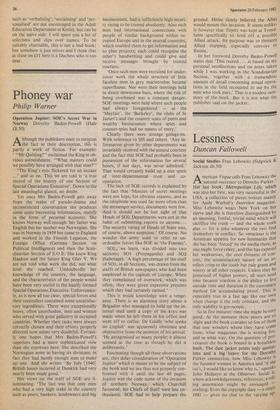Phoney war
Philip Warner
Although the publishers omit to mention the fact in their description, this is partly a work of fiction. For example:
"Mr Quisling?" exclaimed the King in ob- vious astonishment. "What matters could we possibly have arranged with that man?"
`The King's eyes flickered for an instant ...' and so on. This we are told is 'a true record of the history of one Section of Special Operations Executive'. Down to the last meaningful glance, no doubt.
Yet once Mrs Baden-Powell gets away from the realm of pseudo-drama and reconstructed conversation she produces some quite interesting information, mainly in the form of personal accounts. She knows Norway well enough: her father was English but her mother was Norwegian. She was in Norway in 1939 but came to England and worked in the Finnish Legation, the Foreign Office (German Section on Political Intelligence) and then the Scan- dinavian Section of S.O.E. She knew King Haakon and the future King Olav V. We are not told what work she did, nor what level she reached. Undoubtedly her knowledge of the country, the language, and the characteristics of the people would have been very useful in the hastily formed Special Operations Executive. Unfortunate- ly, as is now all too clear, special forces and their controllers contained some unsatisfac- tory ingredients. There were exceptionally brave, often unorthodox, men and women who served with great gallantry in occupied countries. Whether their tasks were always correctly chosen and their efforts properly directed now seems very doubtful. Certain- ly one hopes that Mrs Baden-Powell's superiors had a more sophisticated view than she expresses here. She described the Norwegian army as having six divisions; in fact they had barely enough men to make up one. And she writes: 'By July [1940] British losses incurred at Dunkirk had very nearly been made good.'
Her views on the staff of SOE are il- luminating. 'The fact was that only men who had a very high stake in the country such as peers, bankers, landowners and big businessmen, had a sufficiently high securi- ty rating to be trusted absolutely. Also such men had international connections with people of similar background within oc- cupied Europe and in the neutral countries, which enabled them to get information and to plan projects; each could recognise the other's handwriting and could give and receive messages brought by trusted couriers.
`Once such men were recruited for under- cover work the whole structure of little faceless men in grey macintoshes became superfluous. Nor were their meetings held in sleazy downtown bars, where the risk of being overheard was a constant danger. SOE meetings were held where such people had always foregathered — at the 'Mayfair', the 'Berkeley', the clubs of St James's and the country seats of peers and wealthy businessmen where spies and counter-spies had no means of entry.'
Clearly there were strange goings-on. With reference to SIS and others. Any in- formation given by other departments was invariably received with the utmost courtesy and the fact that SOE had probably been in possession of the information for several hours, if not days, was never admitted.' That would certainly build up a nice spirit of inter-departmental trust and co- operation.
The lack of SOE records is explained by the fact that 'Minutes of secret meetings were not kept, for obvious reasons, and as the telephone was used far more often than the messenger service, documents were few. And it should not be lost sight of that Heads of SOE Departments were not in the habit of submitting reports to anyone... The security rating of Heads of State was, of course, above suspicion.' Of course. No wonder the army used to refer to un- orthodox forces like SOE as 'the Funnies'.
SOL, we learn, was divided into two sections; SOl (Propaganda) and SO2 (Sabotage). 'A high percentage of the staff of SO1, in all Sections, was drawn from the staffs of British newspapers who had been employed in the capitals of Europe. When they complained of overwork, which was often, they were given expensive presents which they had certainly earned.'
This is inside knowledge with a venge- ance. There is an alarming story about a Brigadier who managed to hold up the in- ternal mail until a copy of his keys was made when he left them in his office and went off to coffee. De Gaulle 'who spoke no English' was apparently obstinate and obstructive from the moment of his arrival. `I-le antagonised so many people; it almost seemed at the time as though he did it deliberately.'
Fascinating though all these observations are, they delay consideration of 'Operation Jupiter' which is meant to be the subject of the book and we are thus not properly con- fronted with it until the last 40 pages. Jupiter was the code name of the invasion of northern Norway, which Churchill favoured; his Chiefs of Staff were less en- thusiastic. SOE bad to help prepare the ground. Hitler firmly believed the Allies would mount this invasion. It seems unlike- ly however that Tirpitz was kept at Trond- heim specifically to fend off a possible Allied attack. Its purpose was to threaten Allied shipping, especially convoys to Russia.
In her foreword Dorothy Baden-Powell states that 'This record ... is based on mY personal recollections and on notes taken while I was working in the Scandinavian Section, together with a tremendous amount of detail concerning actual opera- tions in the field recounted to me by the men who took part.' That is a modest sum- mary of the book. But it is not what the publisher said on the jacket.






































 Previous page
Previous page